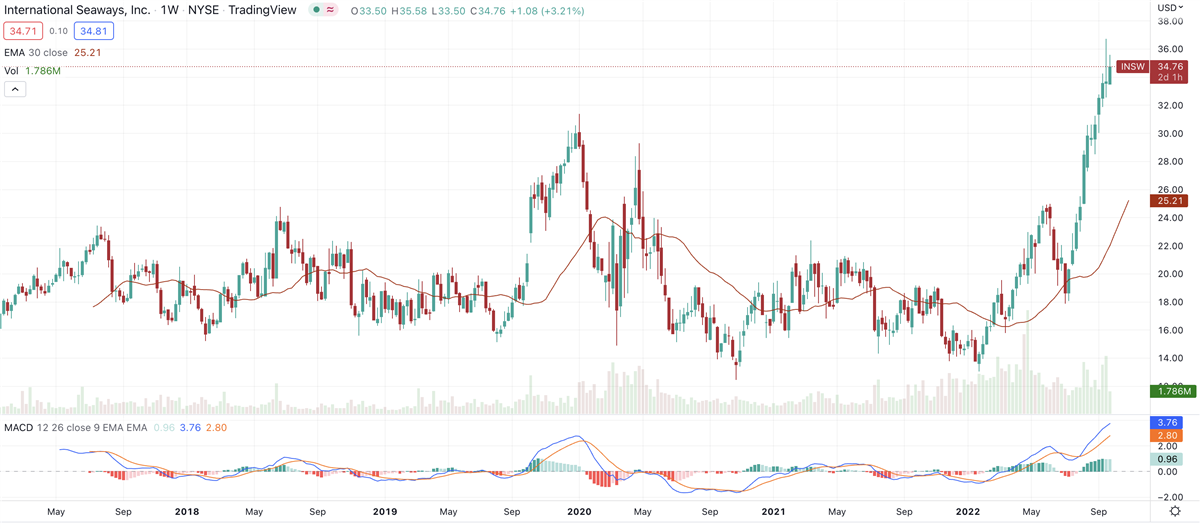- Marine energy transporter International Seaways has posted double- and triple-digit returns while the market has been correcting
- Revenue growth accelerated in the past two quarters, and analysts see strong earnings in the third quarter
- The company raised its dividend earlier this year

It’s not very typical these days to find a stock like International Seaways (NYSE: INSW), which boasts these eye-popping returns:

MarketBeat.com – MarketBeat
- 1 month: +17.69%
- 3 month: +62.69%
- Year-to-date: +139.17%
The New York-based company is a marine transporter of crude oil and other petroleum products. It’s considered part of the midstream industry, within the energy sector.
The company owns and operates a fleet of vessels in two business segments: Product carriers and crude tankers. As the name suggests, crude tankers transport unrefined crude oil to refineries. The smaller product tankers ship the refined products to ports near end users.
This is a small company, with a market capitalization of $1.7 billion and 48.2 million shares in float. Smaller companies like this frequently outperform the broader market, but can be more volatile. When that volatility occurs to the upside, as we’re seeing in this case, it can be a boon for investors.
However, if you’re eyeing this stock, be aware: Because of the small number of shares, there’s not the kind of active price movement you see in a larger stock, such as midstream peer Enterprise Products Partners (NYSE: EPD). If you watch your brokerage or a charting program, you’ll see the price of Enterprise Partners move every few seconds, whereas International Seaways’ price can remain stagnant for minutes. That’s simply a factor of institutional ownership and liquidity.
Now, that doesn’t mean you shouldn’t look into smaller stocks, which, as you see, can deliver outsized returns. Plenty of research has shown that small caps, can, at times, outperform larger stocks. There are several reasons why the asset classes differ in appreciation rates But the lower liquidity of some smaller stocks, like International Seaways, may make it more difficult to buy or sell at the exact price you had in mind. Most of the time, that doesn’t really matter, but be aware of that potential snafu.
Growth Is Accelerating
International Seaways reported its second quarter on August 9, and the stock is up 8.83% since then.
The company has suffered a series of quarterly losses, but revenue growth accelerated in the past two quarters, from 67% to 307%.
However, analysts see the company earning $1.95 per share in the third quarter, on revenue of $214.92 million.
A little over a year ago, International Seaways completed its merger with Diamond S Shipping. The move made the combined company the largest U.S.-listed tanker company by vessel count, with over 100 vessels. Global demand for energy is the biggest driver of the company’s growth. In an interview with CEO Magazine published in July, International Seaways CEO Lois Zabrocky said the company invests in its own infrastructure during down markets, increasing its readiness for boom times, like these.
Wall Street Has Conviction
According to MarketBeat analyst data, the consensus rating on the stock is a “buy” rating. That’s not something you see too often right now, as many good-performing stocks carry the qualifier “moderate buy.”
The company went public in 2016, an outgrowth of predecessor firms. Unlike many small caps, it pays a dividend. Other small companies involved in energy transportation, such as Torm (NASDAQ: TRMD) and Scorpio Tankers (NYSE: STNG), also return a payout to shareholders in the form of a dividend.
International Seaways began paying a dividend in 2020. It increased the quarterly payout to $0.12 per share, from $0.06 per share, for a yield of 1.03%
Given all the positives of this stock, could it be priced to perfection, meaning that it’s ready for some selling in the near term?
It’s possible. Because the company reported a loss in 2021, there’s no current price-to-earnings ratio. But the steep price appreciation is a clue that institutions may be ready to take some profits.
In fact, the stock has been languishing a bit since September 20, with a slight pause in the uptrend, finding support above its 21-day moving average.
That doesn’t mean a fresh rally won’t happen soon, but don’t be shocked if the stock pulls back in the near term, as is typical after an exceptionally strong rally. 


